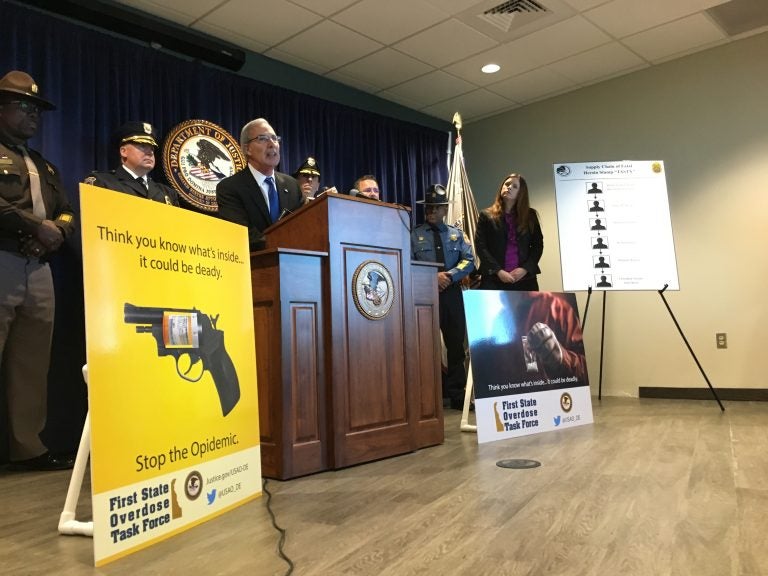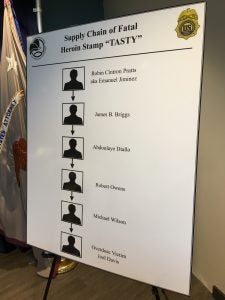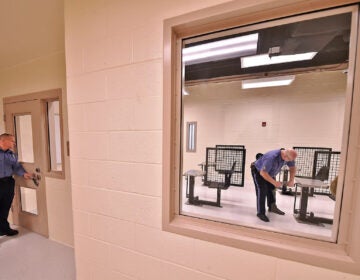Delaware launches overdose task force to prevent opioid deaths

U.S. Attorney for Delaware David Weiss details a new task force led by the DEA to arrest and prosecute those who distribute heroin and fentanyl. (Mark Eichmann/WHYY)
Joel Davis thought he was taking a dose of heroin inside his Newark home on Feb. 15, 2017. What he didn’t know was that the drug had been mixed with the much more powerful synthetic opioid fentanyl.
“The day I found out he died was by far the worst day of my life,” said Sadie Davis, Joel’s sister who now lives in Texas. She said her brother had struggled with addiction for about ten years before his death. “It’s just been really, really rough.”

Davis got the drugs that killed him from his friend and roommate Michael Wilson, who pled guilty to obtaining baggies of heroin laced with fentanyl from Robert Owens. Owens was one link in a chain of dealers leading up to Robin Cintron-Pratts who distributed 13,000 baggies labeled “Tasty,” according to U.S. Attorney for Delaware David Weiss.
Cintron-Pratts was indicted by a federal grand jury in Wilmington this week and is charged with distributing the drugs that resulted in Davis’ death. Wilson, Owens, and two others — Abdoulaye Diallo and James Briggs — pled guilty to drug charges in connection with the distribution ring.
“Joel Davis is one of 345 who succumbed to an overdose death in Delaware in 2017,” Weiss said. “We are determined to identify who has been involved in the manufacturing and mixing of the substance, so we can identify if fentanyl was involved, as ultimately it was in this situation, who’s responsible for introducing that substance into what a Delawarean consumed.”
The investigation is part of the newly launched First State Overdose Task Force — a partnership between the U.S. Attorney’s office, Drug Enforcement Administration, Delaware State Police, and police from New Castle County, Wilmington, Newark, and Dover — “all working together to address overdose deaths that we’re struggling with throughout the state of Delaware,” Weiss said.
Sadie Davis applauded the effort to hold people accountable for distributing drugs that end in the death of users like her brother.
“I was never expecting there to be an investigation,” Davis said. “I am so grateful that we got the chance to see these steps being taken for justice to be served, especially with fentanyl because it’s everywhere.”
The DEA will head up the new task force, coordinating the protocol for local officers who respond to suspected overdose cases.
“DEA special agents are battling cartels both domestic and internationally,” said DEA Assistant Special Agent-In-Charge Shawn Ellerman. “We believe dismantling and disrupting these organizations that traffic narcotics in our communities … is one aspect to help deal with this crisis in the United States.”
The state has taken a number of steps to address the opioid epidemic including the launch of a new program earlier this month to connect those struggling with substance abuse with social services. The Substance Use Treatment and Recovery Transformation Initiative will use peers who have previously struggled with addiction to help.
“I recognize that this is a complicated issue,” Weiss said. “It’s an issue that requires more than just a law enforcement solution. However, there is no question that law enforcement needs to be a critical player in trying to solve this problem.”
Earlier this month, Delaware’s Attorney General released his office’s fourth annual report looking at how the state is managing the opioid crisis. That report found that while there are about 11,000 people in Delaware with substance abuse disorder, the state only has 200 supervised treatment slots. Making more treatment beds available is one way Delaware can beef up its fight against the opioid epidemic, Denn recommended.
In the past four years, about 1,000 Delawareans have died from drug overdoses, mostly as a result of opioids.
WHYY is your source for fact-based, in-depth journalism and information. As a nonprofit organization, we rely on financial support from readers like you. Please give today.





